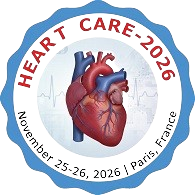Call for Abstract
Scientific Program
33rd World Heartcare Summit, will be organized around the theme “Advancing Cardiovascular Health: Integrating Science, Technology, and Global Expertise”
Heart Care-2026 is comprised of keynote and speakers sessions on latest cutting edge research designed to offer comprehensive global discussions that address current issues in Heart Care-2026
Submit your abstract to any of the mentioned tracks.
Register now for the conference by choosing an appropriate package suitable to you.
Cardiovascular disease (CVD) remains a leading cause of global mortality and is strongly influenced by nutrition. Poor dietary habits contribute to vascular plaque formation and accelerate aging. High intake of ultra-processed foods correlates with increased risks of cardiovascular, coronary, and cerebrovascular conditions. Conversely, plant-based diets have shown a 40% reduction in heart failure risk and lower cardiovascular mortality.
- Atherosclerosis and hypertension influenced by diet
- Nutrient-specific cardiovascular impacts
- Role of dietary cholesterol
- Obesity and cardiovascular risks
This field focuses on catheter-based treatments for heart conditions. Through cardiac catheterization, clinicians diagnose and treat heart valve, muscle, or artery issues. Common interventions include coronary angioplasty and stenting. These procedures reduce post-op recovery time and minimize scarring and discomfort.
- Advances in interventional techniques
- Benefits and risks of cardiac catheterization
- Latest innovations in device-assisted interventions
Cardiometabolic health encompasses metabolic syndrome, diabetes, and obesity-related cardiovascular issues. Lifestyle factors like poor diet and inactivity contribute to high blood pressure, glucose levels, and cholesterol, increasing cardiac risk. Atherosclerosis links both metabolic and cardiac events, emphasizing prevention through lifestyle changes.
- Metabolic syndrome and cardiovascular complications
- Diabetes and heart failure
- Endocrine influences on obesity
- Metabolism and heart health
ACS results from decreased blood flow to the heart, often leading to tissue damage. Typical symptoms include chest pain radiating to the left arm or jaw, nausea, and sweating. ACS is categorized into STEMI, NSTEMI, and unstable angina. Women and older adults may show atypical symptoms.
- Clinical classifications and ECG diagnosis
- Risk assessment and symptom management
- Gender-based diagnostic differences
Cardio-oncology bridges cancer and heart care, addressing cardiovascular effects of cancer treatments. Risk factors like smoking, obesity, and aging impact both diseases. Chemotherapy and radiation can damage cardiac tissues, necessitating preventative strategies and monitoring during oncology treatment.
- Heart disease post-chemotherapy
- Radiation-induced cardiac damage
- Cardiac tumors and syndromes
- Cancer therapies and cardiac outcomes
Geriatric cardiology focuses on diagnosing and managing heart conditions in older adults. Common conditions include arrhythmias, heart failure, and coronary artery disease. Aging exacerbates atherosclerosis and increases cardiovascular mortality, requiring specialized care strategies.
- Cardiovascular aging
- Frailty and multimorbidity in older patients
- Preventive cardiology for the elderly
Heart failure arises when the heart can't pump efficiently. Contributing conditions include coronary artery disease and hypertension. Cardiomyopathies alter heart muscle structure and function, with types like hypertrophic and dilated cardiomyopathy increasing risk of arrhythmias and sudden cardiac death.
- Types of cardiomyopathy
- Early detection and symptom control
- Therapeutic strategies for chronic heart failure
Cardiac imaging enables non-invasive assessment of heart structures and function using MRI, CT, and echocardiography. These tools support accurate diagnosis of congenital defects, ischemia, and valve disorders while minimizing radiation exposure.
- CMR and cardiac CT
- Clinical and diagnostic applications
- Innovations in imaging techniques
Coronary artery disease results from plaque buildup, narrowing arteries and restricting blood flow. Symptoms range from chest pain to silent myocardial infarction. Key risk factors include smoking, high cholesterol, and inactivity. Treatment focuses on lifestyle changes and medical/surgical interventions.
- CAD risk and prevention
- Omega-3s and heart health
- Gender-specific risks
- Novel therapeutic approaches
Cardiac regeneration investigates stem cell therapies and tissue engineering to repair heart tissue post-injury. Advances include progenitor cell transplantation, engineered cardiac tissue, and biomimetic heart valves, offering hope for reversing damage caused by infarction and heart failure.
- Cell-based therapies
- Heart tissue engineering
- Stem cell potential in cardiac repair
Cardiac pharmacology explores drug therapies for hypertension, arrhythmias, and ischemic heart disease. The field also intersects with neuropharmacology due to autonomic control of cardiac function, offering insight into complex cardiac-neural pathways.
- Medications for arrhythmias and hypertension
- Neuro-cardiac connections
- Drug safety and efficacy
Pulmonary hypertension involves increased pressure in pulmonary arteries, leading to shortness of breath and fatigue. Venous thromboembolism includes deep vein thrombosis and pulmonary embolism, posing serious health threats. Early detection and anticoagulant therapy are vital.
- Pulmonary vascular remodeling
- Causes and treatment of VTE
- Diagnostic challenges and innovations
Interventional cardiology offers catheter-based solutions for coronary issues, reducing recovery time. Heart surgery includes valve repairs, bypass grafting, and transplants. Advances like robotic-assisted and off-pump surgeries enhance outcomes and patient safety.
- Angioplasty and stenting
- Robotic heart surgery
- Open vs. minimally invasive surgery
Ongoing research aims to revolutionize cardiology via digital health, AI diagnostics, new drug development, and bioengineering. Novel molecular strategies and precision medicine are shaping the future of heart care.
- AI in cardiology
- Molecular cardiology
- Next-gen diagnostic tools
ICDs detect and correct life-threatening arrhythmias via defibrillation or pacing. They are key for patients at risk of sudden cardiac arrest. Innovations like subcutaneous string defibrillators offer faster implantation and remote monitoring options.
- ICD vs. traditional defibrillators
- Advances in implantable tech
- Mobile integration and patient safety

